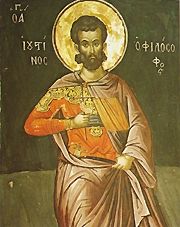
Justin the Philosopher & Martyr and his Companions
June 1
Reading:
This Saint, who was from Neapolis of Palestine, was a follower of Plato the philosopher. Born in 103, he came to the Faith of Christ when he was already a mature man, seeking to find God through philosophy and human reasoning. A venerable elder appeared to him and spoke to him about the Prophets who had taught of God not through their own wisdom, but by revelation; and he led him to knowledge of Christ, Who is the fulfillment of what the Prophets taught. Saint Justin soon became a fervent follower of Christ, and an illustrious apologist of the Evangelical teachings. To the end of his life, while preaching Christ in all parts, he never put off his philosopher's garb. In Rome, he gave the Emperor Antoninus Pius (reigned 138-161) an apology wherein he proved the innocence and holiness of the Christian Faith, persuading him to relieve the persecution of Christians. Through the machinations of Crescens, a Cynic philosopher who envied him, Saint Justin was beheaded in Rome in 167 under Antoninus' successor, Marcus Aurelius (reigned 161-180). Besides his defense of Christianity (First and Second Apologies), Saint Justin wrote against paganism (Discourse to the Greeks, Hortatory Address to the Greeks), and refuted Jewish objections against Christ (Dialogue with Trypho).
Apolytikion in the Plagal of the First Tone
Thou didst empty the cup of the wisdom of the Greeks, and thou didst thirst yet again, till thou camest unto the well where thou foundest water springing to eternal life. And having drunk deeply thereof, thou didst also drink the cup that Christ gave to His disciples. Wherefore, O Justin, we praise thee as a philosopher and Martyr of Christ.
Kontakion in the Third Tone
As the breath of Paradise, the dew descending from Aermon, Christ the Power and the Peace and Wisdom of God the Father, came upon thy thirsting spirit, O Martyr Justin, making thee a spring of knowledge for all the faithful, when thou barest with true valour death as a martyr, to live for ever in Christ.
Reading courtesy of Holy Transfiguration Monastery
Apolytikion courtesy of Holy Transfiguration Monastery
Kontakion courtesy of Holy Transfiguration Monastery
Icon courtesy of St. Isaac's Skete
- Strict Fast
- Wine and Oil Allowed
- Fish Allowed
- Dairy, Eggs and Fish Allowed
- Fast Free